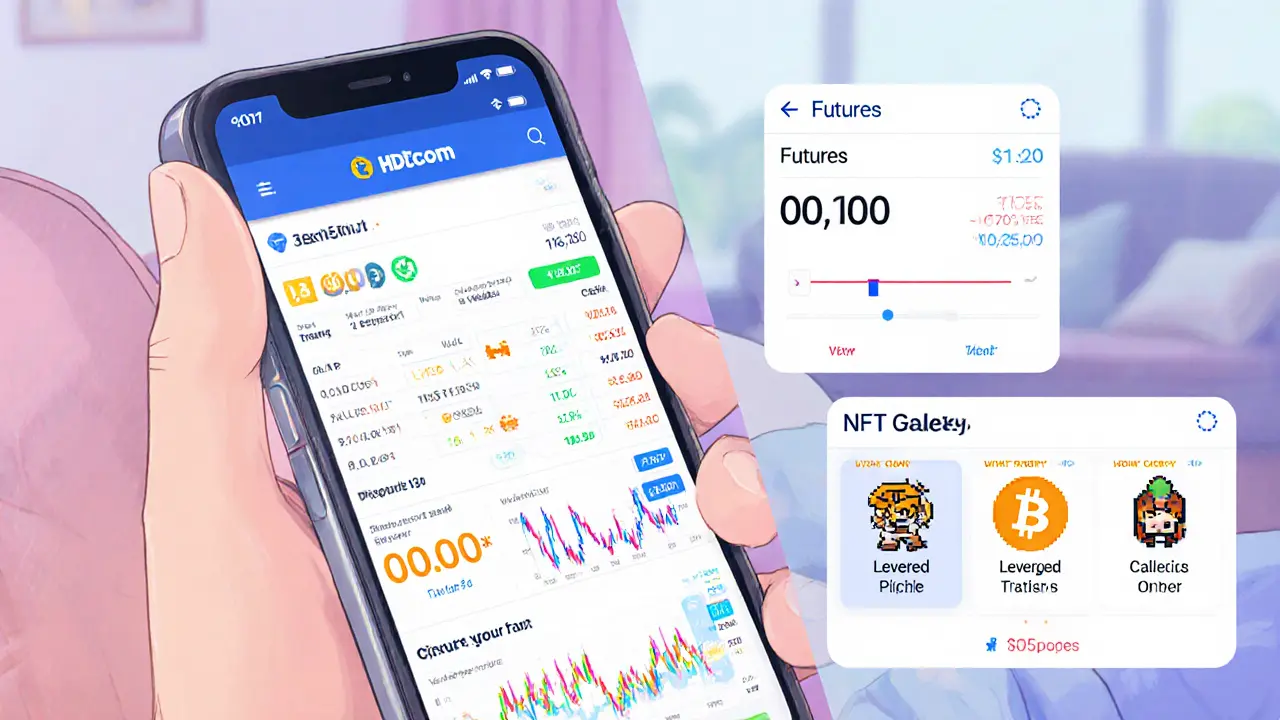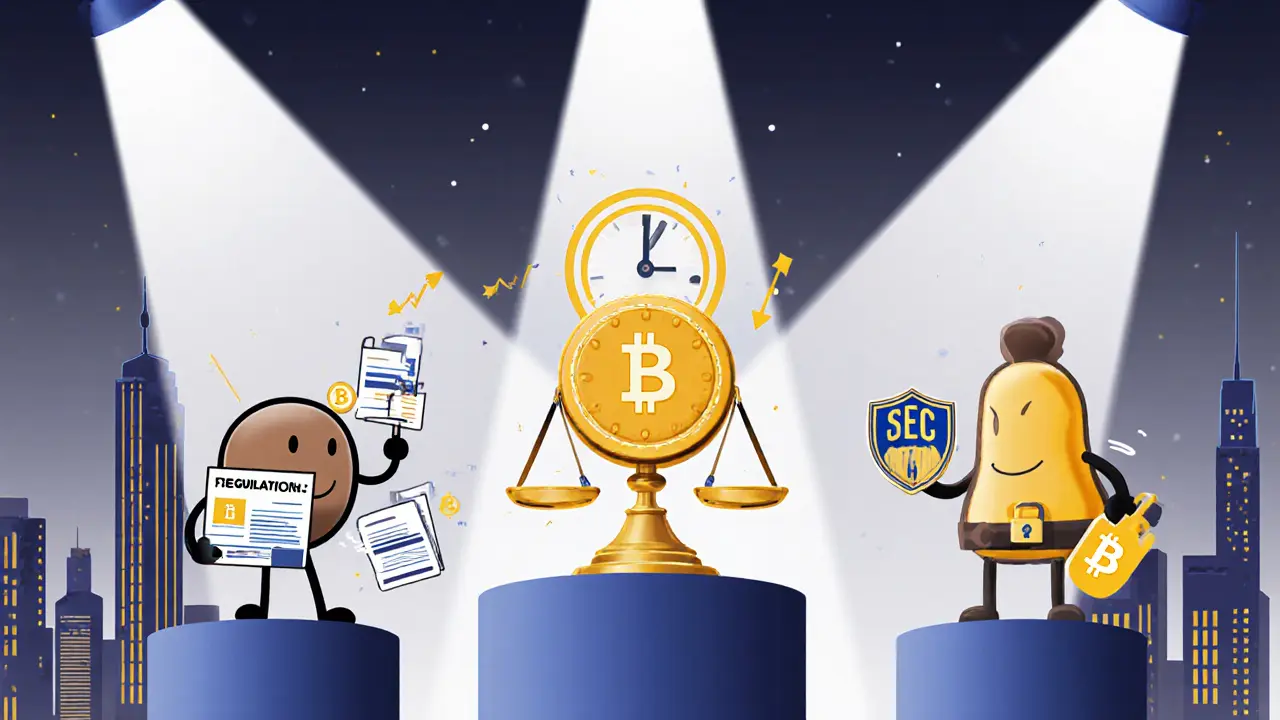HKD.com Fee Calculator
Calculate your potential fees for trading or withdrawing cryptocurrency on HKD.com. Note: The exchange claims 0.00% trading fees but evidence suggests actual fees are 0.02%.
Important Note: HKD.com claims 0.00% trading fees but audits and user reports indicate actual fees are 0.02%. This calculator shows both figures for transparency.
Looking for an honest, up‑to‑date look at HKD.com? This review breaks down what the platform promises, how it actually works, and whether it’s worth your hard‑earned crypto. Expect a mix of real user feedback, hard numbers, and a side‑by‑side comparison with the industry heavyweights.
HKD.com is a Hong Kong‑based cryptocurrency exchange that launched in 2019 and markets itself as a global digital‑asset hub. It runs under HKD.COM LIMITED, with a physical trading floor of roughly 10,000sqft in Hong Kong’s commercial district.
What HKD.com Claims to Offer
The exchange advertises a full suite of services: more than 100 spot pairs, peer‑to‑peer (P2P) trading, futures contracts, NFT marketplace, yield‑earning programs, and a launchpad for new token projects. Mobile apps are available for iOS (v3.1.2) and Android, the latter boasting over 100,000 downloads on Google Play.
Spot Trading, Futures, and NFT Features
Spot trading is the bread‑and‑butter of any exchange, and HKD.com’s list of pairs spans major coins (BTC, ETH, USDT) plus a handful of smaller altcoins. Futures contracts let users bet on price movements with up to 10x leverage, though the platform only lists a limited number of contracts compared with giants like Binance.
The NFT marketplace is a newer addition. It supports minting and secondary sales, but activity is low-daily volume sits in the low‑thousands of dollars, far below dedicated NFT platforms.
Fees and Costs
Fee information is contradictory. Some sources (FxVerify) claim a 0.00% maker and taker fee, which would be a market‑shaking offer. A GitHub audit, however, lists a 0.02% fee for both sides, aligning more with the industry norm. VIP tiers promise further reductions, but the exact thresholds are vague.
Deposits are free, while withdrawals incur a flat network fee that varies by blockchain. For example, Bitcoin withdrawals cost about 0.0005BTC, and Ethereum withdrawals around 0.005ETH. These fees are comparable to other exchanges.
Security Model: Custody, Hot & Cold Wallets
HKD.com uses a custodial model: users do not hold private keys. The platform splits assets between hot wallets for daily trading and cold storage for the bulk of funds. Multi‑signature protection is advertised, meaning at least two of three private keys must sign off on a withdrawal.
While the technical description sounds solid, the real test is user‑reported security incidents. So far, there have been no major hacks reported, but the custodial nature means you must trust the exchange’s internal controls.

Regulatory and Legal Standing
One of the biggest red flags is the lack of clear regulation. FxVerify notes that HKD.com does not appear to be licensed by any financial authority, neither in Hong Kong nor elsewhere. The terms of service give the platform broad discretion to freeze or close accounts if it suspects illegal activity or policy violations.
Without a regulator overseeing its operations, users have limited recourse if funds disappear or the exchange goes offline.
User Experience: App Performance and Withdrawals
Real‑world feedback is mixed at best. iOS reviews frequently mention withdrawal blocks that can last weeks-or even months-citing “financial verification” as the reason. One verified review claims withdrawals were locked for over a year.
Android users report frequent login errors and network timeouts. The app’s rating on Google Play is 3.8stars from 204 reviews, indicating modest adoption and ongoing reliability concerns.
Web traffic data from SimilarWeb shows only 2,742 monthly visits, a 39% bounce rate, and an average session length of just 10.6 seconds. These numbers suggest many visitors either cannot get in or leave quickly due to poor performance.
How HKD.com Stacks Up Against the Big Players
| Feature | HKD.com | Binance | Coinbase |
|---|---|---|---|
| Founded | 2019 | 2017 | 2012 |
| Daily Volume (est.) | ~$1B (self‑claimed) | $50B+ | $8B |
| Regulation | None confirmed | Multiple licenses (e.g., Malta, US) | US SEC‑registered |
| Spot Pairs | 100+ | 600+ | 200+ |
| Futures | Limited | Extensive | None |
| Custody | Custodial (hot + cold, multi‑sig) | Custodial + optional self‑custody | Custodial (US‑regulated cold storage) |
| Withdrawal Issues (user reports) | Frequent, long delays | Rare | Occasional, quick resolution |
| Mobile App Rating (Google Play) | 3.8 ★ (204 reviews) | 4.5 ★ (1M+ reviews) | 4.4 ★ (800k+ reviews) |
| Physical Presence | 10,000sqft Hong Kong store | None | None |
The table makes it clear: HKD.com lags behind on volume, regulation, and user experience. Its unique physical store is novel but does little to offset the digital shortcomings.

Pros, Cons, and Bottom Line
- Pros
- Wide range of services (spot, futures, NFT, launchpad)
- Physical trading floor in Hong Kong
- Low‑fee tier (0.00% advertised)
- Cons
- No clear regulatory licence
- Custodial wallet - you don’t control private keys
- Frequent withdrawal blocks and login errors
- Poor web traffic and engagement metrics
For anyone who values regulatory safety, reliable withdrawals, and a large user community, the cons outweigh the pros. If you’re an early‑stage trader looking for a novel landing spot in Hong Kong and you’re comfortable trusting a custodial service, you might give HKD.com a test run with a small amount. Otherwise, the more established Binance or Coinbase are safer bets.
Key Takeaways
- HKD.com offers a full trading suite but suffers from credibility gaps.
- Fees appear low on paper, but verification is needed.
- Withdrawal delays are a recurring pain point.
- Lack of regulatory oversight raises legal risk.
- Consider more regulated exchanges for larger balances.
Frequently Asked Questions
Is HKD.com regulated?
No public regulator licenses have been identified for HKD.com. It operates without clear oversight from Hong Kong’s Securities and Futures Commission or any other jurisdiction.
What are the withdrawal fees?
Fees depend on the blockchain. Typical charges are about 0.0005BTC for Bitcoin and 0.005ETH for Ethereum. The platform also imposes a network fee that varies with congestion.
Can I trade futures on HKD.com?
Yes, but the selection is limited compared with larger exchanges. Currently available contracts include BTC/USDT and ETH/USDT with up to 10x leverage.
Is the HKD.com mobile app reliable?
User reviews point to frequent login failures and network errors. The latest iOS update (v3.1.2) claims fixes, but many users still report access problems.
How does HKD.com’s security compare to Binance?
Both use hot and cold wallets with multi‑signature protection. However, Binance also offers optional self‑custody and is subject to multiple regulatory licenses, giving it an edge in transparency.


Bobby Lind
The fee schedule looks appealing at first glance, however the contradictory reports on 0.00% versus 0.02% make it hard to trust, especially when the platform advertises ultra‑low maker fees, and users should double‑check the fine print before committing large amounts, because hidden network charges still apply, and the VIP tier thresholds remain vague, so proceed with caution!